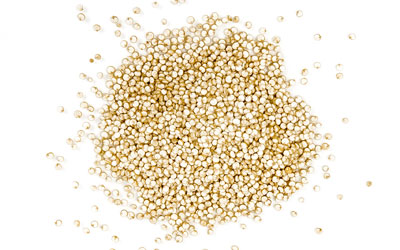Quinoa has been the staple for Andean communities for 5,000 years, providing them with a good source of nutrition and energy.1 In the last few years, considerate scientific effort has shed light on quinoa's health benefits, including this 2020 study published in the European Journal of Nutrition.
In this trial, researchers aimed to evaluate the effects of consuming quinoa biscuits on markers of cardiovascular disease risks.
The Study
This double-blind, randomized crossover clinical trial involved 40 healthy adult volunteers. It took place at the Ulster University in Newtownabbey, United Kingdom.
For the first four weeks, half of the participants was given two biscuits containing 9 grams of quinoa flour per day in addition to their normal diets. The other half ate two wheat flour biscuits daily.
Then, both groups underwent a 6-week washout period, during which no biscuits were consumed. This phase was followed by another four weeks of treatment, with both groups switching regimens (parallel design).
Participants filled out food diaries and physical activity questionnaires throughout treatment. Their physical measurements and fasting blood samples were also analyzed before and during the trial.
The Results
Following quinoa consumption, there was a greater decrease in total and low-density lipoprotein (LDL) cholesterol concentrations in comparison to post-wheat biscuit consumption.
There was also a greater decrease of triglyceride to high-density lipoprotein (HDL) ratio after eating quinoa relative to eating wheat biscuits.
Researchers also noted a 1% reduction in body weight and body mass index (BMI) after four weeks of eating quinoa biscuits.
What Does this Mean?
The findings of this clinical trial demonstrate the effects of daily quinoa consumption on decreasing cardiovascular risks in healthy adults, namely total and LDL cholesterol levels, body weight, and BMI.
These discoveries are wonderful news to healthy and at-risk adults alike. Quinoa flour is an increasingly easily obtainable commodity, and using it to replace a less nutritious wheat flour in baked goods is a simple way to nourish the body from within and maintain good health.
Other herbs with cholesterol-regulating abilities are oats, nuts, beans, and barley.
Sources
- European Journal of Nutrition, Modest improvement in CVD risk markers in older adults following quinoa (Chenopodium quinoa Willd.) consumption: a randomized-controlled crossover study with a novel food product, 2020
Footnotes:
- Purdue University. (2020). Quinoa. Retrieved December 1, 2020 from https://hort.purdue.edu/newcrop/afcm/quinoa.html







